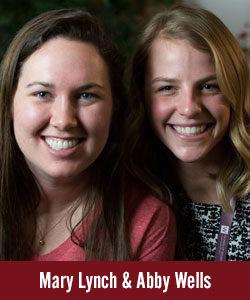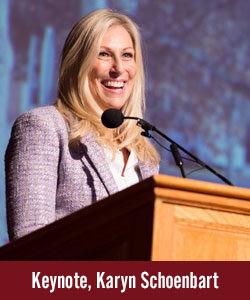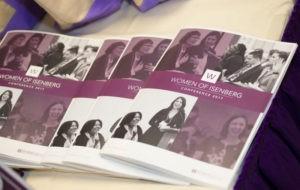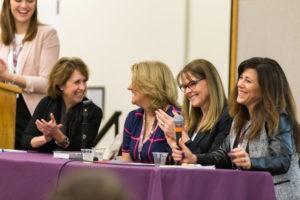How We Built the Women of Isenberg Conference
December 7, 2017
This interview was conducted and edited by WBUR, Boston's NPR news station.
The Women of Isenberg Conference debuted in 2014 with a noble goal: to connect students and faculty with alumnae to build a support network and community of empowerment for collegiate women in business. Through the conference, participants can share experiences and discuss the challenges and opportunities that come with being a woman in the workplace.
There’s clearly a strong need for this kind of community. Now in its fifth year, the conference brought together just over 3000 speakers, alumni, and student attendees. This year’s theme focused on practical topics like leadership styles, networking, and negotiating, helmed by women at the forefront of their respective fields.
The conference is organized each year by a team of undergraduate women from the Isenberg Women in Business organization. Conference organizers include: Kelly McManama ’14, Mary Lynch ’15, Abby Wells ’15, Lauren Casaceli ’15, Diana Ciccolini ‘16, Casey Gover ’16, Meghan Bates ’17, and Christine Cavallaro ’17.
We held a virtual round-table with several conference planners and asked them to share their thoughts about why conferences like these matter.
How did Women of Isenberg Conference come about?
Senior lecturer Jennifer Merton: I think that the first conference really was precipitated to some extent because of Sheryl Sandberg’s “Lean In.” [Having it all] has been an issue throughout my professional life: How do you figure out when you’re going to have children? What’s going to happen to your career?

Mary Lynch: I sat in my finance classes and the only people who raised their hands were men. And in my group projects the only people who contributed were the men. It felt like there was something that needed to be addressed.
Abby Wells: A group of us who were members of the Isenberg Women in Business club attended the Intercollegiate Business Convention at Harvard in 2011, and we decided to plan something similar, but on a smaller scale at Isenberg. We wanted to connect alumni, faculty, and current students to talk about the issues facing women in business.
Lauren Casaceli: One of our goals was to raise the profile of Women in Business organization and all it had to offer students. The organization strives to provide an environment where students can make connections and foster confidence within each other both professionally and personally. The conference provides a forum to bring together Isenberg alumnae and current students.
How did it change your life?
Meghan Bates: Crissy and I went to our first Isenberg Women in Business meeting together at the beginning of our freshman year. We were timid and a bit apprehensive about being part of such a large school. At the time, I never imagined myself holding a leadership position, running a meeting of 200 people, and having women look up to me as a role model. But, as former co-president of Isenberg Women in Business, I was equipped with the skills and the confidence to do just that, and this is all thanks to the past leadership of this organization - Abby, Mary, Lauren, and Kelly.
Casey Gover: My first leadership position was as a part of the team that organizes the conference. Putting the conference together was a hands-on learning experience far beyond what I learned in the classroom.
I had phenomenal mentors like Jane Kaplan and Kristine Elison, [director of development at Isenberg], who helped me along the way. They taught me how to moderate productive meetings, network with grace and poise, and to lead a cohesive team. The conference prepared me for the work-world and I am extremely grateful for that.
Christine Cavallaro: As a freshman, I joined Women in Business because I wanted to be a part of a group of women who were driven and had similar career aspirations as I did. After I attended the Women of Isenberg Conference that same year, I remember reaching out to the leaders at the time so inspired from the day and wishing to get involved. The next year I joined the planning committee. Ultimately Lauren Casaceli, one of the conference co-founders, became my mentor, and she still is today.
How does it feel to be called a mentor?
Lauren: I am very humbled. The best part of being a past conference planner are the relationships that I’ve been able to I develop. Knowing that Crissy looks up to me inspires me to be a better person. I want to provide her with the kind of positive mentorship experience that I’ve been lucky to experience myself. I certainly developed some key mentors through my role in the Women of Isenberg Conference and I am very thankful that I developed a close relationship with Crissy.

What was the most moving part of the 2017 conference for you?
Meghan: The keynote address by Karyn Schoenbart (School of Education), CEO at The NPD Group. Karyn, an education major at UMass, worked her way from the bottom of the organization to the top and was very candid and honest about the challenges, sacrifices, and hard work that her journey to success required.
Lauren: Walking into the general assembly area and seeing how many women came together the day of the conference to make connections and, more importantly, take an active role in learning about the business world through alumni, is really inspiring.
How have the topics you cover evolved to reflect the modern workplace?
Abby: The first year we started the conference, the pamphlet was four pieces of paper stapled together, printed out on our dorm room printers. It’s very exciting to see where it could go from here. If [the conference] has grown this much in four years, what can it be in another four years?
When the conference started, it was more focused on work-life balance and how women should behave in a male-dominated industry or job. The conversation has evolved into how women can do a better job of supporting other women in the workplace. What’s your passion? versus What are you supposed to do?
Lauren: At the first conference I believe there were 100 people in attendance. This year, at the 2017 conference, there were over 250 attendees. That’s incredible! What’s more incredible, though, is the continued commitment to the original goal of the event— to connect Isenberg women. There are certainly more speakers in attendance every year, and the speakers are predominantly Isenberg alumni, which shows how powerful the network is and how passionate alumni are about coming back to support Women in Business.
What skills did you develop thanks to the conference?

Casey: The women involved in the Women In Business club and the Women Of Isenberg Conference know how to get things done. The club is filled with goal-driven and go-getter women—just being around them is motivating.
I was able to consistently practice public speaking, time-management, and written communication skills. I often joke that I should have received an extra degree in effective email writing. The conference was also a major point of conversation in job interviews. Explaining my role in the conference to prospective employers helped me land the job I have now.
Meghan: The underlying message of Isenberg Women in Business is something that I’ve always been passionate about: empowering women in the workplace. Because of my involvement with this organization, I have developed the leadership skills and confidence that I never dreamed that I would have.
Lauren: I, of course, learned a lot of tactical skills, including the importance of time management and organization, along with how to be a good communicator. By working side by side with Isenberg leaders, I learned what it takes to build and review sponsorship packages and how to make a strong case to garner financial support from organizations. Planning the conference certainly gave me a great perspective when starting my own career.
What are your hopes for the conference–for women and business–in the future?

Meghan: I hope [the undergraduate conference attendees] walk away feeling inspired and motivated by these women who have had fantastic success in their careers. I also hope attendees never feel hindered by the fact that they are women, but rather empowered by this.
Christine: There is a wide diversity of age and experience among the women attending the conference. I hope attendees take everybody’s stories and advice into consideration and then go out and take that next step towards their current career goal, whatever it may be.
Mary: My goal for this conference is that it won’t exist in 10 years. That there won’t be a gender wage gap in 20 years, and there will be an equal amount of male and female CEOs at Fortune 500 companies. The whole goal for the Women in Business club is to push women forward and to be a catalyst for change.
Read all stories written in sponsorship with WBUR here.